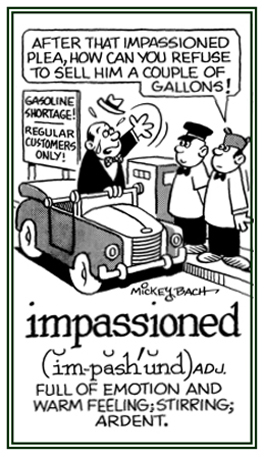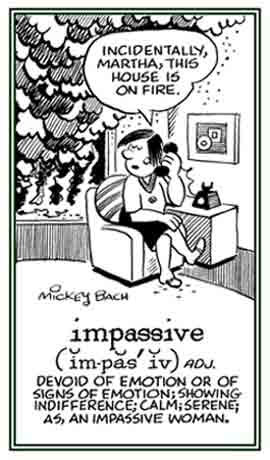pass-, pati-
(Latin: suffering, feeling; enduring)
The chances of histoincompatibility increase the more dissimilar the host and donor are from each other.
2. Concerning a person who is not touched or moved to passion or sympathy: Jack's sister Jill was in an impassible state of mind when she found out that her mother was involved with another man.
4. Relating to an individual who is unfeeling or not showing feeling; impassive: At the funeral James was quite impassible because he didn't know the person who had passed away.
5. Pertaining to a person who is not susceptible to, or not capable of feeling physical pain or injury; sensationless: When Ruth broke her arm, she was impassible for a moment or two because she didn't feel any throbbing or shooting pain at all!
Did you notice that the im- prefix of impassion and impassioned are intensive while the im- prefix used with the previous word (impassionate) has the meaning of “no, not, lacking,” etc.? It shows that one cannot depend on these prefixes to mean the same thing for all words.
Not too many years ago, just about every gasoline truck in the U.S. had large signs painted on them that said, INFLAMMABLE. Since most people thought that the prefix in- meant “not”, they interpreted INFLAMMABLE to mean NOT FLAMMABLE. Now the trucks carry the painted signs: FLAMMABLE to eliminate any confusion.
The Family Word Finder, a Reader‘s Digest publication, says, “Flammable has now replaced its older synonym inflammable [from Latin inflammare, to kindle) in technical and commercial usage, where the word FLAMMABLE on a dangerously combustible product is thought to serve as a more unmistakable warning.”
2. Concerning a person who is free from, or not governed by, passion; calm, dispassionate: He spoke to her in a quite impassionate voice, with not one spark of emotion.
2. Descriptive of warmth and intensity without violence, and suggests fluent verbal expressions: Tom loved June so much that he shouted out in an impassioned and emotional way that he would love her for ever and ever!
3. Characteristic of an oration or of a speech that is fervent, fiery, and stirring: Janet gave a very impassioned talk at the meeting about preserving the wildlife area outside the town instead of building the factory, which only a few wanted.


Go to this Word A Day Revisited Index
so you can see more of Mickey Bach's cartoons.
2. A reference to an expressionless or an unresponsive reaction to something that might normally excite fear or emotion: When Lynn heard of the news of her father's death from the doctor, her eyes flooded with tears, distorting her impassive and controlled composure.
3. Relating to an insensible, calm, or an unperturbed condition or behavior to a serious situation: Mr. Hill remained sitting in an impassive and expressionless manner while his verdict was being announced that he would have to spend 3 years in jail.
4. Characteristic of a deprived feeling or sensation: Because of the very strong medication, Albert was quite impassive and apathetic to the suffering around him.

Go to this Word A Day Revisited Index
so you can see more of Mickey Bach's cartoons.
2. An inclination to be irritable or intolerant; failure to bear suffering, discomfort, annoyance, etc.: Barbara's impatience was showing because she was waiting for a very important letter in the mail.
Mr. Lawson's impatience was quite noticeable in the waiting room at the doctor's office because he had been waiting for at least an hour before it was his turn!
Impatience is waiting in a hurry.
2. Regarding an individual who shows restless eagerness to do something, go somewhere; overzealous, hasty: Little Ivy was so impatient to go see her grandmother in Germany that she packed her bag a month before leaving home!
3. Descriptive of someone who lacks endurance; irritable, irascible, easily provoked: Greg was sick with the flu and was so impatient to get well again that he became very snappy and exasperated with his parents for keeping him in bed so long!
2. Concerning how someone is uneasy or restless: Jack impatiently waited for his wife to finish getting ready to go to the concert.
3. Pertaining to how an individual yearns or hopes for something that causes uneasiness: Gary was very anxious to see his girlfriend, and waited impatiently for her to finally arrive with the airplane at the airport!
![]() If you would like to take a couple of self-scoring quizzes over some of the words in this section, then click on the Pati-Quiz links below.
If you would like to take a couple of self-scoring quizzes over some of the words in this section, then click on the Pati-Quiz links below.
![]() Self-scoring Pass-, Pati- Quiz #1.
Self-scoring Pass-, Pati- Quiz #1.
![]() Self-scoring Pass-, Pati- Quiz #2.
Self-scoring Pass-, Pati- Quiz #2.


